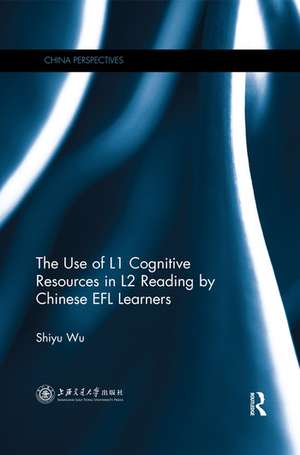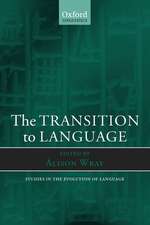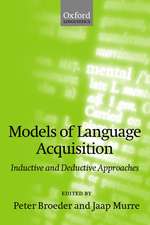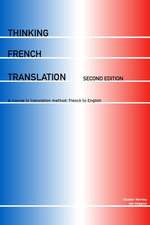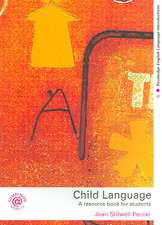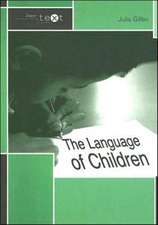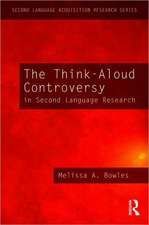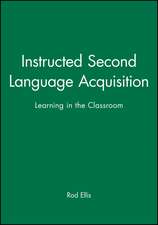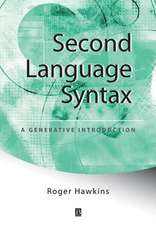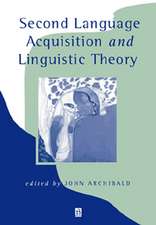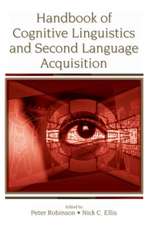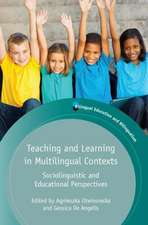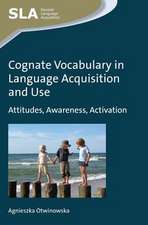The Use of L1 Cognitive Resources in L2 Reading by Chinese EFL Learners: China Perspectives
Autor Shiyu Wuen Limba Engleză Paperback – 28 apr 2020
| Toate formatele și edițiile | Preț | Express |
|---|---|---|
| Paperback (1) | 389.66 lei 6-8 săpt. | |
| Taylor & Francis – 28 apr 2020 | 389.66 lei 6-8 săpt. | |
| Hardback (1) | 1013.10 lei 6-8 săpt. | |
| Taylor & Francis – 25 mai 2016 | 1013.10 lei 6-8 săpt. |
Din seria China Perspectives
-
 Preț: 310.96 lei
Preț: 310.96 lei -
 Preț: 310.08 lei
Preț: 310.08 lei -
 Preț: 309.99 lei
Preț: 309.99 lei -
 Preț: 303.36 lei
Preț: 303.36 lei -
 Preț: 313.81 lei
Preț: 313.81 lei -
 Preț: 309.99 lei
Preț: 309.99 lei -
 Preț: 353.07 lei
Preț: 353.07 lei -
 Preț: 310.22 lei
Preț: 310.22 lei -
 Preț: 311.41 lei
Preț: 311.41 lei - 9%
 Preț: 934.94 lei
Preț: 934.94 lei - 9%
 Preț: 934.94 lei
Preț: 934.94 lei -
 Preț: 279.66 lei
Preț: 279.66 lei -
 Preț: 310.43 lei
Preț: 310.43 lei -
 Preț: 280.65 lei
Preț: 280.65 lei -
 Preț: 289.74 lei
Preț: 289.74 lei -
 Preț: 301.81 lei
Preț: 301.81 lei -
 Preț: 310.65 lei
Preț: 310.65 lei -
 Preț: 496.28 lei
Preț: 496.28 lei -
 Preț: 308.53 lei
Preț: 308.53 lei -
 Preț: 490.51 lei
Preț: 490.51 lei - 9%
 Preț: 1070.57 lei
Preț: 1070.57 lei - 9%
 Preț: 933.72 lei
Preț: 933.72 lei - 9%
 Preț: 934.94 lei
Preț: 934.94 lei - 26%
 Preț: 987.33 lei
Preț: 987.33 lei - 26%
 Preț: 929.97 lei
Preț: 929.97 lei - 26%
 Preț: 624.60 lei
Preț: 624.60 lei - 26%
 Preț: 850.95 lei
Preț: 850.95 lei - 18%
 Preț: 1109.18 lei
Preț: 1109.18 lei - 26%
 Preț: 928.76 lei
Preț: 928.76 lei - 18%
 Preț: 1109.36 lei
Preț: 1109.36 lei - 26%
 Preț: 875.55 lei
Preț: 875.55 lei - 48%
 Preț: 628.10 lei
Preț: 628.10 lei - 18%
 Preț: 1109.18 lei
Preț: 1109.18 lei - 26%
 Preț: 875.55 lei
Preț: 875.55 lei - 18%
 Preț: 784.00 lei
Preț: 784.00 lei - 26%
 Preț: 1013.10 lei
Preț: 1013.10 lei - 18%
 Preț: 887.43 lei
Preț: 887.43 lei - 26%
 Preț: 875.55 lei
Preț: 875.55 lei - 26%
 Preț: 986.91 lei
Preț: 986.91 lei - 26%
 Preț: 929.97 lei
Preț: 929.97 lei - 18%
 Preț: 1109.18 lei
Preț: 1109.18 lei - 18%
 Preț: 780.87 lei
Preț: 780.87 lei - 15%
 Preț: 453.68 lei
Preț: 453.68 lei - 26%
 Preț: 875.55 lei
Preț: 875.55 lei - 18%
 Preț: 1109.18 lei
Preț: 1109.18 lei - 18%
 Preț: 1217.71 lei
Preț: 1217.71 lei - 26%
 Preț: 1186.64 lei
Preț: 1186.64 lei
Preț: 389.66 lei
Nou
Puncte Express: 584
Preț estimativ în valută:
74.57€ • 77.38$ • 62.33£
74.57€ • 77.38$ • 62.33£
Carte tipărită la comandă
Livrare economică 15-29 martie
Preluare comenzi: 021 569.72.76
Specificații
ISBN-13: 9780367516505
ISBN-10: 0367516500
Pagini: 162
Dimensiuni: 156 x 234 x 9 mm
Greutate: 0.45 kg
Ediția:1
Editura: Taylor & Francis
Colecția Routledge
Seria China Perspectives
Locul publicării:Oxford, United Kingdom
ISBN-10: 0367516500
Pagini: 162
Dimensiuni: 156 x 234 x 9 mm
Greutate: 0.45 kg
Ediția:1
Editura: Taylor & Francis
Colecția Routledge
Seria China Perspectives
Locul publicării:Oxford, United Kingdom
Public țintă
Postgraduate, Professional, and UndergraduateCuprins
1 Introducing the Study 1.Need for the Study 2.Research Questions 3.Significance of the Study 4.Basic Concepts and Constructs 5.Outline of the Book 2 Research Background 2.1 Reading and Reading Research 2.2 A Brief History in L2 Reading Research 2.3 Previous Research about the Effects of L1 Reading on L2 Reading 2.4 Previous Research on L1 Cognitive Use in L2 Reading 3 Theoretical Perspectives 3.1 The Structure Building Framework 3.2 Vygotsky¡¯s Sociocultural Theory 3.3 Theories of Transfer 4 Research Design and Methodology: The Test-based and Product-Oriented Experiments 4.1 The Effects of L1 Reading Ability on L2 Reading: The Research Design 4.2 The Transfer of the Building of Mental-representations: The Research Design 5 Research Design and Methodology: The VPA-based and Process-Oriented Experiment 5.1 Subjects 5.2 Method 5.3 Material 5.4 Data Collecting Procedure 5.5 Transcribing Verbal Reports 6 Results and Discussion: The Test-based and Product-Oriented Experiments 6.1 Question 1 6.2 Question 2 6.3 Question 3 6.4 General Findings 6.5 Reading Problems or Language Problems 6.6 Automaticity or Control in L2 Reading 7 Results and Discussion: The VPA-based and Process-Oriented Experiment 7.1 The Threshold Effect 7.2 The Role of L1 Cognitive Use in L2 Reading 7.3 Discussion and Conclusion 8 Conclusion 8.1 Findings Based on Test-based and Product-oriented Experiments 8.2 Findings Based on the VPA-based and Process-oriented Experiments
Notă biografică
Shiyu Wu is Associate Professor at the School of Foreign Languages, Shanghai Jiao Tong University. Her research interest includes Greek classics, Western languages, second language acquisition, and second language psycholinguistics.
Descriere
This book focuses on the effects of L1 cognitive resources on L2 reading e.g. the effects of L1 reading ability, the ability in L1 mental-structure building, L1 cognitive use in L2 reading, and other related cognitive mechanisms and capacities of EFL learners in China. It integrated test-based and product-oriented as well as VPA-based (verbal protocol analysis) and process-oriented experiments to address the problems of reading in a second language. This book provides several theoretical, methodological and pedagogical insights, including the multidimensional nature of L2 reading and Vygotskyan sociocultural theory as a suitable L2 reading framework, combined approaches on L2 studies, and the rewarding active use of L1 cognitive resources in L2 learning.
